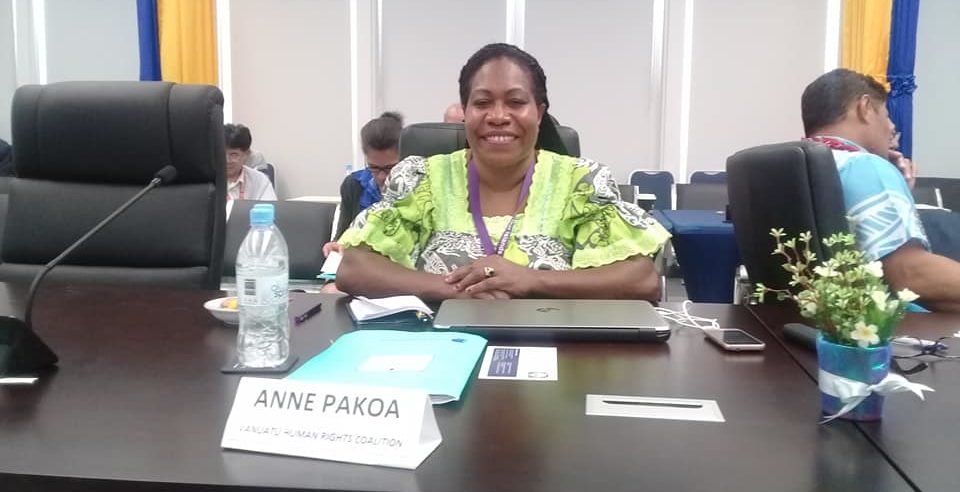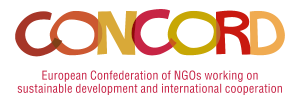Anne Pakoa is a vocal figure in Vanuatu’s civil society. In the light of current negotiations between EU and African, Caribbean and Pacific countries, Ms Pakoa exchanges views with CONCORD on the Cotonou Agreement, civil society space, climate action and women’s rights.


What is this about?
The Cotonou Partnership Agreement (CPA), signed in 2000 by the European Union Member States and 78 African, Caribbean and Pacific countries (ACP), was eye-opening for a number of reasons. In particular, the CPA was forward-looking for civil society (CS) space and participation in this framework: it recognised a wide set of actors that went beyond the signatory states of the agreement, including the recognition of the diverse roles of civil society.
As the Cotonou Partnership Agreement is coming to an end in 2020, negotiations for a new agreement are currently in full swing. These negotiations offer ample reasons for CONCORD to try to influence the new agreement between EU and ACP countries for the benefit of all people and the planet.
Anne Pakoa: Vanuatu’s Human Rights defender
Anne Pakoa is a household name in the Pacific region’s Civil Society world. As Secretary of the Vanuatu Human Rights Coalition, she is both vice-chair of the African-Caribbean-Pacific (ACP) Non-State Actors Network Steering group as well as part of the Civil Society Forum. Climate justice, civil society participation, and women’s rights are at the core of Ms Pakoa’s daily business. Reasons enough for us to gather her insights on the importance of the post-Cotonou EU/ACP relationship.
The Cotonou Agreement: Time for Reflection
With the Cotonou Partnership Agreement (CPA) coming to an end, we take this opportunity to look back at the past 19 years of collaboration. A major success of CPA was its recognition of civil society organisations (CSOs) as crucial actors in the political, economic and social dimensions. Anne Pakoa gives a concrete example of what this process of recognising CSOs meant in her region:
An organisation I founded back in 2003 called Anne’s Christian Community Health School and Nursing Services was a recipient of an EU/NSA grant in 2008. We received a small mini-bus to deliver mobile nursing care services to communities which have difficulty accessing medical treatment and health care services. With the minivan, we were able to reach out to women and girls in need of contraception as well as assist those who could not afford travel costs to the main hospital.
It is these experiences that lead Ms Pakoa to pledge for the preservation of development cooperation with civil societies in the next EU/ACP agreement, as “capacity building is very important for us and those working in support of states in delivery programmes and services to the communities.”
Considering all their added value, CSOs, including CONCORD, have stated that it is not enough to simply recognise the importance of civil societies to ensure their meaningful participation at all levels. In fact, with CPA showing some structural weaknesses, the future EU/ACP partnership agreement needs to put in place concrete mechanisms to really ensure civil society engagement and financial support for CSOs. Anne Pakoa:
I do find a lot of weaknesses in terms of states’ collaboration with CSOs and how the continuous funding assistance from EDF through Development Cooperation is implemented. I really do hope that the EU can recognise the importance of the roles Civil Society Organisations play in achieving regional and national goals through EU Funding initiatives.
Civil Society Participation: Ensuring our space
It is not only the structural weaknesses of the CPA that may stand in the way of meaningful civil society participation. Space for civil society organisations to monitor and influence policy making is shrinking worldwide, including in ACP countries. As the International Service for Human Rights points out, systematic oppression of human rights defenders is widespread, reaching from putting in place bureaucratic hurdles to harassment and arbitrary restrictions.
In the light of these developments, CONCORD put forward concrete proposals to ensure civil society space within the EU-ACP framework.
While Anne Pakao states that in Vanuatu she enjoys “full recognition and support from the government”, she calls on CSOs to rise up to their global challenges and use a “stronger voice than ever to influence changes for the common good.”

Anne Pakoa speaking up for Civil Society
Dialling Up the Dialogue: How to reach the grassroots
The African, Caribbean and Pacific countries include 78 states, reflecting a vast diversity of challenges, priorities and aspirations. It is therefore not sufficient that EU/ACP agrees on civil society participation at an international level: the dialogue between governments and civil society has to be strengthened way into the grassroots. As CONCORD’s recommendations suggest, this can be done by introducing standing civil society bodies at regional levels (chapter I and II).
Being asked how Vanuatu, a state made up of a variety of islands, can foster the decentralisation of civil society participation, Anne Pakao explains:
Recently, Vanuatu, through the Department of Local Authorities, launched the first ever NGO policy to support services delivery from the state, reaching through the grassroots. This policy compliments Vanuatu’s decentralisation act to ensure social and economic justice for everyone at every level of the state deep into our villages.
Scaling up Climate Action
As a representative of the Pacific region, Anne Pakao is vocal on one of the most pressing issues of our time. To counteract climate change, she states, the EU and the ACP need to “urgently and concretely scale up their climate actions within 10 years in line with Pacific priorities, and lead the global community to limit the rise of global temperature below 1.5C.”
While preparing to better manage the impact of climate change and disasters at a local level by improving communities’ resilience to natural hazards, Ms Pakao also calls for the inclusion of a Loss and Damage (L&D) pillar within the next EU/ACP partnership.
CONCORD’s recommendations for the next EU/ACP agreement on environmental sustainability (chapter 4) are to provide a holistic approach on climate action, and to “capitalise on past successful cooperation in international fora, such as in the case of the adoption of the Paris Agreement.”
Enforcing Women’s Rights
Being an outspoken advocate for women’s rights, Anne Pakao sees major shortfalls within her country as regards gender discrimination.
A big challenge in promoting peace and security in Vanuatu is the social norm that women are classified as 2nd class citizens! For the past 12 years, women have not had the opportunity to participate in Vanuatu’s National Parliament. Gaining senior positions in the employment sector is still a challenge for women. Issues of illiteracy are high in rural and most remote areas, leading to a lack of confidence in young mothers and girls to apply for jobs and create their own income. When girls are illiterate, they also find themselves in difficult situations in making the right choices in life, such as advancing themselves academically and securing paid jobs. Results of a survey done by the Vanuatu Women Center shows high discrimination against women and girls in emotional violence.
Ms Pakao calls for the EU-ACP partnership to respect the rights of women and to provide the opportunities for political engagement. One of her major concerns is the right for women to participate in Vanuatu’s national parliament. In addition, Ms Pakao asks to provide more learning opportunities for girls and to fund CSOs to track and report on progresses.
CONCORD has laid out its visions for the future EU-ACP partnership agreement, calling for a strengthened social dialogue with small entrepreneurs and women’s organisations.

What's next?
The third meeting of EU and ACP chief negotiators Neven Mimica and Robert Dussey took place on April 4th 2019 in N’djamena, Chad. This meeting officially kicked-off the second phase of negotiations, building on the agreed future structure of the post-Cotonou framework. This structure will be based on a foundation (common to all signatory countries) and three regional pillars (EU-Africa, EU-Caribbean, EU-Pacific). While there are still agreements to be found on some of the priorities the foundation will include, the two chief negotiators are picking up parallel talks with regional partners already. One such meeting took place in Samoa between EU Commissioner Neven Mimica, Robert Dussey and their Pacific partners. On that occasion, Pacific CSOs published their position paper “Pacific CSO Position on Post-Cotonou Agreement,” taking up the opportunity for Pacific Civil Society to raise its voice.
Similarly, the EU-Caribbean meeting took place on April 15 while the EU-Africa regional meetings is set to take place on May 20.
The Cotonou Partnership Agreement will come to an end by end of February 2020, so the new EU-ACP agreement should be finalised and ratified by beginning of March of the same year. A very ambitious plan.

Speaking with one voice: ACP Civil Society Organisations stand together during a consultation held on March 8 2019.
CONCORD’s Positions
As mentioned throughout this article, CONCORD, the European NGO confederation for relief and development, is setting out what it believes this next partnership between the European Union and African-Caribbean-Pacific countries should entail. To find out about CONCORD’s ideas for a partnership focusing on sustainable development and human rights and the Confederation’s recommendations for a more meaningful civil society participation, feel free to read on!
